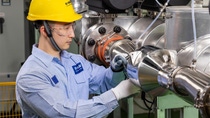Factbook
Environmental Catalyst and Metal Solutions
BASF’s Environmental Catalyst and Metal Solutions (ECMS) division is a global market leader in mobile emissions catalysts and precious metals trading, recycling and related products and services. Leveraging its deep expertise, ECMS serves customers in many industries including light and heavy-duty automotive, aerospace and the hydrogen economy, and provides full loop services with its precious metals trading and recycling offering.
Sales by direct customer industry 2024

Portfolio
Mobile emissions catalysts
The mobile emissions catalysts business unit provides innovative and cost-effective technologies that control emissions from gasoline and diesel-powered passenger cars, trucks, buses, off-road vehicles and motorcycles. The unit also offers technologies to improve cabin air quality in airplanes. ECMS is the preferred development partner for our customers, with manufacturing sites, research and development labs and sales offices located in all major regions.
Leading OEMs rely on ECMS to ensure they can meet increasingly stringent current and upcoming emissions regulations implemented throughout the world. ECMS catalysts used in exhaust aftertreatment systems of gasoline vehicles remove critical pollutants like hydrocarbons, carbon monoxide and nitrogen oxides as well as particulate matter. ECMS diesel engine catalysts remove particulates and other pollutants from diesel engine exhaust.
The business is backward-integrated into zeolite production and partners with key suppliers around the globe to ensure security of supply.
ECMS is also a leading supplier of ozone removal systems for many aircraft. The technology reduces harmful ozone and volatile organic compounds in aircraft cabin air. This improves air quality and odors from sources such as jet fuel, lubricant leaks and on-ground maintenance activities.
Precious metal services and recycling
This business unit has in-depth knowledge and vast experience in the field of end-to-end metals management. ECMS offers automotive and industrial customers “full loop” services ranging from precious metal supply and recycling to financial risk management. Its full loop offering begins with ensuring security of supply through our global recycling business as well as sustainable sourcing of precious metals via relationships with mining companies. Additionally, the business has precious metals trading offices in the United States, United Kingdom, Japan and China that provide metal sourcing and price risk management services for our global customer network and for mobile emissions catalysts and other BASF units.
Through ECMS recycling operations, precious metals are recovered from spent catalyst and scrap materials, providing the business with an additional level of secondary supply that can be used to meet its own needs for platinum group metals (PGM) and those of customers. Recycled metal comes at a significantly lower carbon footprint than primary mined metal, supporting decarbonization of the supply chain. Customers looking to reduce their carbon footprint can purchase 100% recycled metal under the brand name Verdium™.
ECMS also operates a temperature sensing business that serves a wide range of industries, providing accurate and precise measurement of mission critical temperatures.
Additionally, the division supports the growing green hydrogen economy with circular solutions that improve performance and reduce costs for proton exchange membrane (PEM) electrolysis and fuel cells. ECMS offers catalyst coated membranes (CCMs) that support PEM electrolyzers for hydrogen production, fuel cell catalysts that utilize hydrogen to produce electricity with only water as a by-product, and innovative Celtec® membrane electrode assemblies (MEAs) that enable high-temperature PEM fuel cell technology.
Market position and main competitors
ECMS holds one of the top three market positions in all strategic business areas in which it is active.
The main competitors (alphabetical order) include Cataler, Heraeus, Johnson Matthey, Sibanye-Stillwater, Tanaka, Techemet and Umicore.
Focus of research and development
For mobile emissions catalysts, the focus is on total cost of ownership and providing improved, cost-competitive products to meet future vehicle emission standards.
Precious metal services and recycling is developing next-generation electrocatalysts and catalyst coated membranes to improve performance and reduce cost for proton exchange membrane (PEM) electrolyzers and fuel cells. This includes partnering with component producers in the hydrogen market for PEM electrolysis and fuel cells to ensure a capital efficient structure and flexibility to respond to market growth.
Acquisitions/JVs/investments
From 2022 onward
| Product group | Description | Year |
| Mobile emissions catalysts | Capacity expansion in Chennai, India | 2022 |
| Precious metal services | Construction of production facility for green hydrogen and fuel cell components in Budenheim, Germany | 2024 |
| Refinery capacity expansion in Seneca, South Carolina | 2022 | |
| Acquisition of Arc Metal AB in Hofors, Sweden | 2024 |
Divestitures/shutdowns
From 2022 onward
| Product group | Description | Year |
| Precious metal services |
Closure of BASF HERAEUS (China) Metal Resource Co., Ltd., Pinghu, China | 2026 |
Innovation

New BASF VOC2.0™ catalyst technology available on Airbus A320 fleet
A new volatile organic compound/ozone converter (VOZC™) technology from ECMS is available for installation on Airbus’ A320 family of aircraft. This technology provides a sustainable and cost-effective way for airlines to mitigate fume events and minimize maintenance related to odor events. In addition to improving aircraft operational reliability, the new technology offers passengers and crew one of the cleanest cabin air solutions available today. VOZC offers a step-change improvement by removing more than 90% of the most odorous VOCs – such as valeric acid – in the bleed air entering the cabin. Unlike alternative options in the market, ECMS VOZCs are proven to clean air of ozone and VOCs and they can last for thousands of flights before needing routine service.